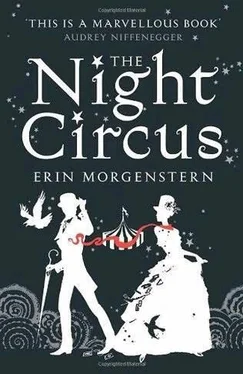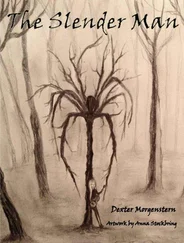His attention only wavers away from Celia once, when Chandresh knocks over a heavy crystal wineglass that narrowly avoids crashing into one of the candelabras, spilling red wine over the gold brocade of the tablecloth.
But before Marco can react, Celia leaps to her feet from across the table, righting the glass without touching it, a detail only Chandresh has the proper perspective to notice. When she takes her hand away, the glass is filled again, the tablecloth spotless.
“Clumsy, clumsy,” Chandresh mutters, looking at Celia warily before turning away to pick up his conversation with Mr. Barris.
“You could have been a ballerina,” Mme. Padva remarks to Celia. “You are quite good on your feet.”
“I am good off my feet as well,” Celia says, and Mr. Barris nearly knocks over his own glass while Mme. Padva cackles.
For the remainder of the dinner, Celia keeps a watchful eye on Chandresh. He spends most of the time discussing some sort of renovation to the house with Mr. Barris, occasionally repeating himself though Mr. Barris pretends not to notice. Chandresh does not touch his wineglass again, and it is still full when it is cleared at the end of the course.
After dinner, Celia is the last to leave. During the exodus, she misplaces her shawl and refuses to let anyone wait for her while she searches for it, waving them away into the night.
It proves difficult, attempting to locate a length of ivory lace in the singular chaos of la maison Lefèvre. Though she traces her steps through the library and the dining room it is nowhere to be found.
Eventually, Celia abandons her search and returns to the foyer, where Marco is standing by the door with her shawl folded casually over his arm.
“Are you looking for this, Miss Bowen?” he asks.
He moves to place it on her shoulders but the lace disintegrates between his fingers, falling into dust.
When he looks up at her again she is wearing the shawl, tied perfectly, as though it had never been removed.
“Thank you,” Celia says. “Good night.” She breezes by him and out the door before he can respond.
“Miss Bowen?” Marco calls, chasing after her as she descends the front stairs.
“Yes?” Celia responds, turning back as she reaches the pavement.
“I was hoping I could trouble you for that drink we did not have in Prague,” Marco says. He holds her eyes steadily with his while she considers.
The intensity of his gaze is even stronger than it had been when it was focused on the back of her neck, and while Celia can feel the coercion of it, a technique her father was always fond of, there is something genuine as well, something almost like a plea.
It is that, coupled with curiosity, that causes her to nod her consent.
He smiles and turns, walking back inside the house, leaving the door open.
After a moment, she follows. The door swings shut and locks behind her.
Inside, the dining room has been cleared but the dripping candles still burn in the candelabras.
Two glasses of wine sit on the table.
“Where has Chandresh gone to?” Celia asks, picking up one of the glasses and walking to the opposite side of the table from where Marco stands.
“He has retired to the fifth floor,” Marco says, taking the remaining glass for himself. “He had the former servants’ quarters renovated to keep as his private rooms because he enjoys the view. He will not be down until the morning. The rest of the staff has departed, so we have the majority of the house to ourselves.”
“Do you often entertain your own guests after his have gone?” Celia asks.
“Never.”
Celia watches him while she sips her wine. Something about his appearance bothers her, but she cannot identify what, exactly.
“Did Chandresh really insist that all the fire in the circus be white so it would match the color scheme?” she asks after a moment.
“He did indeed,” Marco says. “Told me to contact a chemist or something. I opted to take care of it myself.” He runs his fingers over the candles on the table and the flames shift from warm gold to cool white, tinged with a silvery blue in the center. He runs his fingers back in the other direction, and they return to normal.
“What do you call it?” Marco asks.
Celia does not need to ask what he means.
“Manipulation. I called it magic when I was younger. It took me quite some time to break that habit, though my father never cared for the term. He’d call it enchanting, or forcibly manipulating the universe when he was not in the mood for brevity.”
“Enchanting?” Marco repeats. “I had not thought of it as such before.”
“Nonsense,” Celia says. “It’s precisely what you do. You enchant. You’re clearly good at it. You have so many people in love with you. Isobel. Chandresh. And there must be others.”
“How do you know about Isobel?” Marco asks.
“The company of the circus is fairly large but they all talk about each other,” Celia says. “She seems utterly devoted to someone whom none of us has ever met. I noticed immediately that she pays particular attention to me, I even wondered at one point if she might be my opponent. After you appeared in Prague when she was waiting for someone it was rather simple to figure out the rest. I do not believe anyone else knows. The Murray twins have a theory that she is in love with the dream of someone and not an actual person.”
“The Murray twins sound quite clever,” Marco says. “If I am enchanting in that way it is not always intentional. It was helpful in securing the position with Chandresh, as I had only a single reference and little experience. Though it does not seem to be working quite so effectively on you.”
Celia puts down her glass, still not certain what to make of him. The shifting light from the candles enhances the indistinct quality about his face, so she looks away before she replies, turning her attention to the contents of the mantelpiece.
“My father used to do something similar,” she says. “That pulling, charming seduction. I spent the first several years of my life watching my mother pine for him, steadfastly. Loving and longing far beyond the time when he had lost what little interest in her he ever held. Until one day when I was five years old and she took her own life. When I was old enough to understand, I promised myself I would not suffer so for anyone. It will take a great deal more than that charming smile of yours to seduce me.”
But when she looks back, the charming smile has disappeared.
“I am sorry you lost your mother in such a way,” Marco says.
“It was a long time ago,” Celia says, surprised by the genuine sympathy. “But thank you.”
“Do you remember much about her?” he asks.
“I remember impressions more than actualities. I remember her constant crying. I remember how she looked at me as though I was something to be feared.”
“I do not remember my parents,” Marco says. “I have no memories before the orphanage that I was plucked out of because I met some unspecified criteria. I was made to read a great deal, I traveled and studied and was generally groomed to play some sort of clandestine game. I’ve been doing so, along with accounting and bookkeeping and whatever else Chandresh requests of me, for most of my life.”
“Why are you being so honest with me?” Celia asks.
“Because it is refreshing to be truly honest with someone for a change,” Marco says. “And I suspect you would know if I lied to you outright. I hope I can expect the same from you.”
Celia considers this a moment before she nods.
“You remind me a bit of my father,” she says.
“How so?” Marco asks.
“The way you manipulate perception. I was never particularly good at that myself, I’m better with tangible things. You don’t have to do that with me, by the way,” she adds, finally realizing what disconcerts her about his appearance.
Читать дальше












